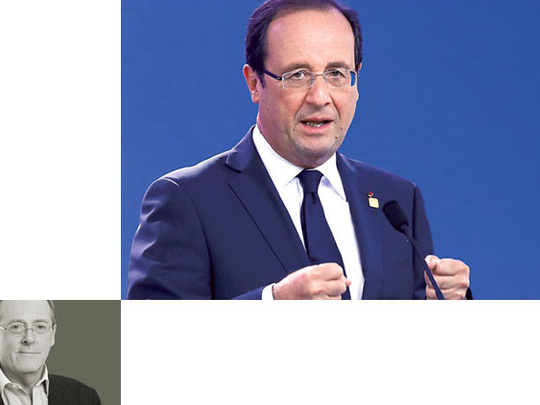
A recent poll by French conservative daily Le Figaro shows that 64 per cent of the French would be disappointed by President Francois Hollande’s first five months of activity. A fierce Sarkozy supporter, the newspaper concludes that “a lack of preparation” and “hesitation” have been so far the “two main characteristics of the French new presidency”.
Lack of illusion was certainly the common mood among many French who elected Hollande last May. A kind of resentment against the personality of outgoing president Nicolas Sarkozy did not mean a full rejection of his policies — nor a particular appetite for the newcomer’s ones. Everyone was aware that prevailing economic conditions in Europe could hardly allow miracles to happen.
Yet, a series of events contributed to accelerate the defiance process. An endless list covers the economic space (rising unemployment, growth prospects revised downward, industrial issues — carefully postponed by predecessors) and more specifically, the budget preparation. It was marked by an unprecedented increase of €30 billion in tax pressure versus a public expenses decrease of €10 billion only. The inability of any Socialist government to reduce spending was confirmed another time, with the level of public spending now reaching 56 per cent of the French GDP, versus 46 per cent in Germany.
Several mistakes in other fields added up, including communication (government’s withdrawal on the capital-gains tax issue further to the ‘Pigeons’ hostility move), political coherence, public fights among some ministers, contradictory declarations on nuclear industry, working hours at school, use of ‘soft’ drugs etc. Worse, the Green allies voted against the government’s decision to ratify the European budgetary ‘golden clause’ whilst their representatives in the government didn’t even consider resigning.
A reason or a consequence is undoubtedly Prime Minister Jean-Marc Ayraud’s poor authority and obvious lack of savoir-faire, especially when he says there is nothing more urgent to do these days than changing the law on marriage and allowing homosexual partners to marry and adopt children.
Surprisingly, the Right opposition hasn’t drawn much political profit from the situation, partly because of its own problems. Main opposition party UMP is to elect a new leader, which has given room to a merciless fight between former Prime Minister Francois Fillon and UMP General Secretary Jean-Francois Cope, a staunch ally of Sarkozy who himself claims every day through friends and magazines that he is willing to come back into French politics. Despite a poor political input, the right of course claims they have all appropriate answers to the mentioned difficulties. They just missed to implement them when they were in command.
Dose of reality
Fundamental reforms in that environment can hardly take off. As for the French foreign policy, it is enough to look at presidential initiatives to realise that there is no need to comment. Truisms about civil wars horrors, exhortations and wishful thinking can hardly take lieu of an inspired foreign policy. Is it thus just a matter of time before Hollande takes up his marks, as a recent editorial by weekly Le Point suggested? One should acknowledge the fact that for the first time in 30 years, a French president has taken stock of the situation and decided not to hide it from his fellow citizens: Yes, France is the world’s fifth-largest economy, where low borrowing costs linked to a high birth-rate give it a long-run advantage. But it spends too much and its competitiveness is too low.
Hollande can’t be held responsible for a situation which has constantly worsened over the years under both Left and Right policies. But he is the one who must correct it, but his proposals are puzzling. In a recent speech at an SME’s gathering, he insisted on the need to establish a “competitiveness pact” in France, which to him means an orderly process developing over a period of time. Hollande already anticipates he wants to focus on the French public debt, tax weight, administration complexity, cost of energy, competitiveness and labour market rigidities. Nothing less …
Going that route indeed means, as an example, that a decrease in labour charges supported by entrepreneurs should be compensated by other revenues. An increased ‘value-added tax’ on consuming goods is frequently mentioned (as recalled last Sunday by 98 CEO’s demanding an immediate €30-billion cut in social charges). Will Hollande’ supporters allow for it when a latest gaffe by Ayrault about reviewing the 35-hour working week makes an uproar ? Will a French Socialist confirm that it is not only Germans that are able to implement necessary reforms, as former chancellor Gerhard Schroeder did in 2004? History will see, together with the results of next local elections, in 2014.
Luc Debieuvre is a French essayist and a lecturer at IRIS (Institut de Relations Internationales et Stratégiques) and the FACO Law University of Paris.









